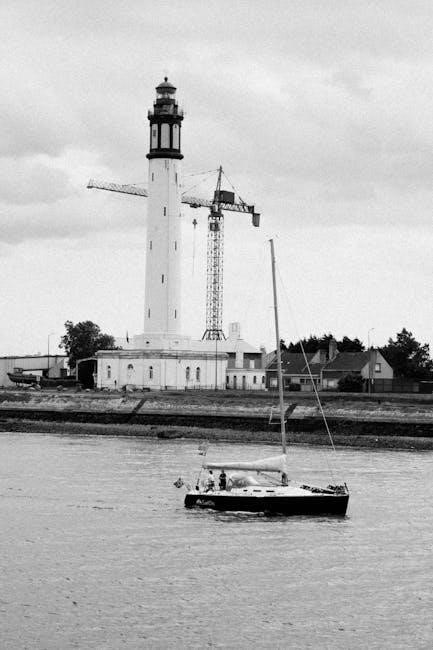Thornton Wilder’s timeless play, Our Town, explores life in Grovers Corners, New Hampshire, reflecting on time, family, and mortality. Available in PDF, it remains a literary staple.

1.1 Background of the Play
Thornton Wilder’s Our Town was first performed in 1938, exploring life in the fictional town of Grover’s Corners, New Hampshire. The play is divided into three acts, each capturing a moment in time: daily life, love, and death. It reflects on universal themes like time, family, and mortality, set against the backdrop of early 20th-century America. The minimalist style and the Stage Manager’s direct narration create a unique storytelling experience. The play won the Pulitzer Prize and remains a cornerstone of American theater, offering profound insights into human existence.
1.2 Importance of the Play in Literature
Our Town is a landmark of American literature, celebrated for its poignant exploration of universal themes such as time, family, and mortality. Its minimalist style and direct narration by the Stage Manager revolutionized theater, emphasizing simplicity and emotional depth. The play’s ability to connect with audiences universally has made it a timeless classic, widely studied and performed. It earned Thornton Wilder the Pulitzer Prize in 1938, cementing its place as a cornerstone of dramatic literature and a reflection of human experiences across generations.
1.3 Availability of “Our Town” in PDF Format
Accessing Our Town in PDF format is straightforward, with various online platforms offering digital copies. Many websites provide free downloads, while others require purchase. Platforms like Amazon, Google Books, and educational databases often include PDF versions of the play. Additionally, study guides and analysis in PDF format are widely available for academic purposes. This accessibility ensures that readers can easily engage with Thornton Wilder’s timeless work, making it convenient for both personal reading and educational use.
Setting of “Our Town”
The setting of Our Town is in Grovers Corners, New Hampshire, spanning over a decade. It portrays ordinary life, emphasizing universal themes through its minimalist approach.
2.1 Time Period of the Play
The play is set between 1901 and 1913 in the fictional town of Grovers Corners, New Hampshire. It spans over a decade, capturing the simplicity of early 20th-century American life. The story unfolds in three acts, each representing a distinct period: the everyday routines of 1901, a wedding in 1904, and a reunion in 1913. This timeline highlights the passage of time, emphasizing themes of daily life, love, and mortality. The era reflects a simpler, close-knit community, mirroring the cultural values of small-town America during that period.
2.2 Location: Grovers Corners, New Hampshire
Grovers Corners, New Hampshire, is the fictional setting of Our Town, representing a quintessential small American town. The play captures the simplicity and charm of rural life, emphasizing the universality of human experiences. The town’s small population and close-knit community highlight its isolation and routine, reflecting early 20th-century America. The setting, including Main Street, the railroad tracks, and the town cemetery, plays a crucial role in shaping the story and its themes. The location’s ordinariness underscores the play’s focus on everyday life and its significance.
2.3 Cultural Context of the Early 20th Century
The early 20th century in America was marked by societal shifts, including the rise of industrialization and urbanization. Small towns like Grover’s Corners reflected traditional values, emphasizing family, community, and simplicity. The post-World War I era brought a sense of optimism and change, yet rural areas remained rooted in their customs. The cultural context highlights the tension between progress and tradition, as seen through the characters’ lifestyles and interactions. This backdrop shapes the play’s themes of daily life, human connection, and the passage of time.
Main Characters in “Our Town”
The play revolves around Emily Webb, George Gibbs, and the Stage Manager. Emily is the intellectual, compassionate soul, while George embodies ordinary life. The Stage Manager guides the narrative, connecting the audience to Grover’s Corners, highlighting themes of life, love, and community through their journeys.

3.1 Emily Webb: Her Role and Significance
Emily Webb is the emotional heart of “Our Town,” representing innocence, love, and wisdom. Her journey from childhood to marriage to death highlights her growth and understanding of life. In Act III, her poignant reflection on life after death underscores the play’s themes of appreciation and mortality. Emily’s character serves as a bridge between the audience and the deeper meanings of the story, making her one of the most memorable figures in American theater.
3.2 George Gibbs: His Character and Development
George Gibbs is a central character in “Our Town,” embodying the simplicity and charm of small-town life. Initially portrayed as a typical adolescent, George evolves into a responsible adult, deeply committed to his family and community. His relationship with Emily Webb highlights his loyalty and dedication. Despite his flaws, George’s journey reflects universal struggles and growth, making him relatable. His character underscores the importance of family, friendship, and the quiet heroism found in everyday life, resonating deeply with audiences.
3.3 The Stage Manager: Narration and Commentary
The Stage Manager in “Our Town” serves as both narrator and commentator, guiding the audience through the story and offering reflections on life. Breaking the fourth wall, the Stage Manager directly engages with the audience, creating a unique storytelling dynamic. Through philosophical commentary, the character highlights themes of time, human connection, and the ordinary moments that define existence. This role bridges the gap between the play and the audience, making the narrative feel both personal and universal, while emphasizing the timeless relevance of the story.
Themes in “Our Town”
“Our Town” explores themes like time, community bonds, and life’s fleeting nature, resonating deeply and making the play timeless and emotionally impactful universally.
4.1 The Passage of Time
In “Our Town,” the passage of time is a central theme, reflecting on life’s transient nature. The play’s three acts—daily life, marriage, and death—highlight time’s relentless progression. Through the Stage Manager’s narration, Wilder underscores the universality of time’s passage, encouraging audiences to appreciate life’s moments. The minimalist set and direct address to the audience emphasize the inevitability and shared human experience of time’s flow. This theme resonates deeply, prompting reflection on mortality and the importance of living fully.
4.2 Importance of Family and Community
In “Our Town,” family and community are portrayed as the backbone of life in Grovers Corners. The play emphasizes the interconnectedness of its residents, showcasing how daily interactions and shared experiences foster a sense of belonging. The Webb and Gibbs families exemplify this, with their relationships highlighting the strength derived from unity. Through the Stage Manager’s commentary, Wilder underscores the importance of human connections in creating meaning and supporting one another through life’s challenges. This theme remains central to the play’s enduring relevance.
4.3 Reflections on Life and Death
“Our Town” deeply explores life and death, with Act III focusing on Emily’s journey after death. Her reflections reveal the beauty of life, often overlooked by the living. The play highlights the inevitability of death, urging characters and audiences to cherish life’s fleeting moments. Through Emily’s poignant realization, Wilder emphasizes the importance of appreciating everyday joys and connections. The Stage Manager’s philosophical commentary underscores the universality of death, reminding us to value life’s simplicity and significance. This theme resonates profoundly, encouraging mindfulness and gratitude.

Symbolism and Metaphors
“Our Town” uses the Stage Manager as a symbolic narrator and employs minimalist settings to explore life’s universality. Everyday objects carry deeper meanings, reflecting life’s simplicity and significance.
5.1 The Use of the Stage Manager as a Narrator
The Stage Manager in Our Town serves as a unique narrator, blending storytelling with philosophical commentary. Breaking the fourth wall, the character directly engages the audience, creating a sense of intimacy and universality. This role transcends traditional narration, offering insights into the human condition and the passage of time. The Stage Manager’s casual tone and meta-theatrical approach highlight the play’s themes, making the audience reflect on life’s simplicity and significance. This innovative storytelling technique is central to the play’s enduring appeal.
5.2 Symbolism in the Setting and Props
The setting of Our Town is minimalist, with few props, symbolizing the universality of life’s experiences. Grovers Corners represents any small town, emphasizing the ordinary as extraordinary. The Webb and Gibbs homes, though simple, reflect family values and community ties. Props like the wedding dress in Act II symbolize unity and continuity. The cemetery in Act III, with its plain stones, underscores the inevitability of death and equality in eternity. These elements highlight Wilder’s focus on life’s simplicity and deeper meanings, contrasting the mundane with the profound.

Literary Analysis
Thornton Wilder’s minimalist style in “Our Town” emphasizes universal themes through simple dialogue and sparse stage directions, reflecting life’s profundity in its ordinary moments across three acts.
6.1 Structure and Format of the Play
The play is divided into three acts, each focusing on a different aspect of life in Grover’s Corners: daily life, marriage, and death. Thornton Wilder employs a non-linear narrative, blending past, present, and future. The Stage Manager acts as a narrator, breaking the fourth wall to guide the audience. The minimalist format, with sparse stage directions, emphasizes the universality of the story. This structure allows the audience to reflect on the simplicity and profundity of everyday life, making the play timeless and relatable. PDF versions of “Our Town” retain this format, ensuring its original intent remains intact.
6.2 Thornton Wilder’s Writing Style
Thornton Wilder’s writing style in “Our Town” is distinctive and innovative. He blends realism with philosophical reflection, creating a sense of timelessness. The play’s minimalist approach, devoid of elaborate dialogue, emphasizes universal themes. Wilder’s use of the Stage Manager as a narrator breaks traditional dramatic conventions, fostering audience engagement. His prose is simple yet profound, allowing the audience to reflect deeply on life’s ordinary moments. This style is preserved in PDF versions of the play, ensuring its originality and emotional impact remain intact for readers.

Historical Context
The play explores early 20th-century America, reflecting cultural shifts and societal norms. The historical context is vital for understanding its themes, preserved in PDF versions for study.
7.1 The Play’s Premiere and Reception
Our Town premiered on February 4, 1938, in Princeton, New Jersey. The play initially received mixed reviews, with some critics finding its minimalist style unconventional. However, its exploration of universal themes resonated deeply with audiences; Over time, it gained widespread acclaim, winning the Pulitzer Prize for Drama in 1938. Its unique narrative structure and poignant reflection on life and death solidified its place in American theater history. The play’s success can be attributed to its ability to connect with viewers on an emotional level, transcending its historical context. Its enduring popularity is evident in its continued performance and study today.
7.2 Historical Events Influencing the Play
Our Town was influenced by the cultural and historical landscape of the early 20th century. The Great Depression shaped Wilder’s exploration of everyday life, emphasizing simplicity and community. World War I’s aftermath also impacted the play, as it reflected a society grappling with change and the meaning of life. Additionally, the rise of industrialization and urbanization contrasted with the play’s rural setting, highlighting the tension between tradition and modernity. These historical events enriched the play’s universal themes, making it a timeless reflection of human experience and societal transformation.

Stage Directions and Instructions
8.1 Minimalist Set Design
The play’s minimalist set design is a hallmark of its simplicity, reflecting Wilder’s belief in the audience’s imagination. The stage is nearly bare, with only essential props like stools or tables. This stripped-down approach emphasizes the universality of the story, allowing viewers to focus on emotions and dialogue rather than elaborate scenery. The minimalist design also mirrors the quiet, unassuming nature of life in Grover’s Corners, creating an intimate and timeless atmosphere. This innovative style was groundbreaking, influencing future theater productions and reinforcing the play’s enduring appeal.
8.2 Use of Lighting and Sound
Lighting and sound in Our Town are employed sparingly to enhance the play’s emotional depth and minimalist style. Lighting changes subtly to signify time transitions, such as dawn or dusk, while sound effects, like a train whistle, emphasize key moments without overwhelming the audience. The simplicity of these elements aligns with the play’s themes of everyday life, allowing the audience to focus on the characters’ experiences and dialogue. This understated approach creates a poignant connection between the audience and the story, reinforcing the play’s universal appeal and emotional resonance.
The Role of the Audience
The audience in Our Town is invited to engage deeply, reflecting on universal themes and everyday life through direct address and minimalist storytelling, fostering introspection and connection.
9.1 Audience Engagement and Reflection
The audience in Our Town plays a crucial role as active participants, not just spectators. Thornton Wilder’s use of direct address and minimalist staging encourages audience engagement, fostering a deeper connection to the narrative. This approach invites viewers to reflect on the universal themes presented, such as the passage of time and the significance of everyday moments. By stripping away elaborate sets, the focus remains on the characters’ experiences, prompting the audience to contemplate their own lives and the broader human condition.
9.2 The Play’s Universal Appeal
Our Town captivates audiences globally with its timeless exploration of universal themes such as family, community, and the human condition. The play’s simplicity and relatable characters transcend cultural and temporal boundaries, making it a cherished piece of American literature. Its focus on everyday life resonates with diverse audiences, while its minimalist style allows for versatile interpretations. This universal appeal ensures its enduring popularity, as it continues to evoke reflection and emotional connection in readers and viewers across generations.
Educational Significance
Our Town is widely studied in schools for its deep exploration of human life, family dynamics, and community values, making it a vital part of American curriculum;
10.1 Teaching “Our Town” in Schools
Our Town is a cornerstone of high school and college curricula, offering insights into American life, universal themes, and literary techniques. Teachers often use the play to explore themes of family, community, and the human condition. Its simple yet profound narrative encourages critical thinking and emotional reflection. The availability of Our Town in PDF format makes it accessible for classroom use, allowing students to analyze the text deeply. Its timeless relevance ensures its continued presence in educational settings, fostering meaningful discussions and connections to real-life experiences.
10.2 Study Guides and Resources Available in PDF

Study guides and resources for Our Town are widely available in PDF format, providing students and educators with valuable tools for analysis and teaching. These resources often include character summaries, thematic discussions, and activity ideas. PDF guides enhance understanding of the play’s complexities and facilitate classroom discussions. Many websites and educational platforms offer free or accessible downloads, making it easier for learners to engage deeply with Wilder’s work. These supplementary materials are essential for both independent study and structured learning environments, enriching the educational experience.

Adaptations and Interpretations
Our Town has been adapted into films, radio plays, and modern stage interpretations, each offering unique perspectives on Wilder’s timeless themes. These adaptations highlight the play’s universal appeal and versatility, allowing new audiences to connect with its enduring message. Modern directors often infuse contemporary elements while preserving the original’s emotional depth, ensuring its relevance across generations and cultural boundaries.
11.1 Film and Theater Adaptations
The timeless appeal of Our Town has led to numerous film and theater adaptations, each capturing its essence. The 1940 film adaptation, starring Martha Scott and William Holden, remains a classic, earning an Academy Award nomination. Modern stage productions often experiment with minimalist sets and innovative storytelling, staying true to Wilder’s vision while engaging contemporary audiences. These adaptations ensure the play’s themes of life, love, and mortality continue to resonate, making it a beloved work across generations and mediums.
11.1 Modern Interpretations of the Play
Modern interpretations of Our Town often emphasize its universal themes through contemporary lenses. Directors frequently incorporate diverse casting and minimalist staging to highlight the play’s timeless relevance. Some productions explore non-traditional formats, blending multimedia elements with Wilder’s original dialogue. These reinterpretations resonate with today’s audiences by reflecting modern societal changes while preserving the core emotional depth of the story. Such adaptations ensure the play remains a vital exploration of human experience, connecting past and present in meaningful ways.

Cultural Impact
Our Town has profoundly influenced American theater, earning a Pulitzer Prize and becoming a timeless reflection of life. Its enduring relevance highlights universal human experiences, ensuring its popularity endures.
12.1 Influence on American Theater
Our Town revolutionized American theater with its minimalist set design and direct audience address. Winning the 1938 Pulitzer Prize, it challenged traditional storytelling, inspiring playwrights to experiment with non-realistic techniques. Its exploration of universal themes through a small-town lens resonated deeply, making it a benchmark for American drama. The play’s innovative structure and heartfelt narrative continue to influence contemporary theater, ensuring its enduring legacy as a foundational work in American theatrical history.
12.2 Popularity of the Play Today
Our Town remains a beloved classic in contemporary theater, widely performed and studied. Its timeless themes of life, family, and community resonate with modern audiences. Schools and community theaters frequently produce the play due to its relatable story and minimal production requirements. The availability of Our Town in PDF format has further boosted its accessibility, making it a staple in educational curriculums and amateur productions. Its enduring appeal lies in its universal relevance, ensuring its continued popularity across generations.
Our Town beautifully explores universal themes, offering timeless reflections on life, family, and community. Its enduring relevance ensures its continued appreciation and study, even in PDF formats.
13.1 Summary of Key Points
Our Town is a poignant exploration of life, family, and community, set in the early 20th century. Its timeless themes resonate universally, making it a cornerstone of American literature. The play’s minimalist style and the Stage Manager’s narration emphasize the ordinary yet profound nature of human existence. Availability in PDF format has made it accessible for study and reflection, ensuring its enduring relevance. Its themes of love, loss, and the passage of time continue to captivate audiences and inspire new interpretations.
13.2 Final Thoughts on “Our Town”
Our Town remains a timeless masterpiece, offering profound insights into human existence. Its exploration of life, love, and loss resonates deeply, transcending generations. The availability of the play in PDF format has ensured its accessibility for study and reflection. As a work of enduring relevance, it continues to inspire adaptations and interpretations, including a notable film version. The play’s universal themes remind us to cherish the beauty in everyday moments, making it a cherished part of American literary heritage and a timeless reflection on the human experience.




About the author